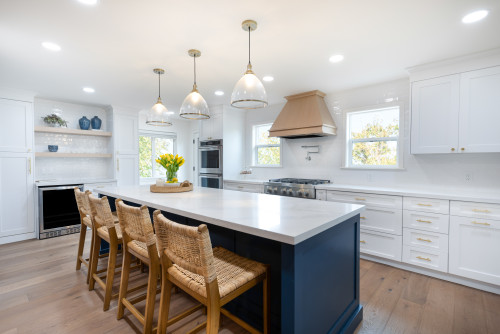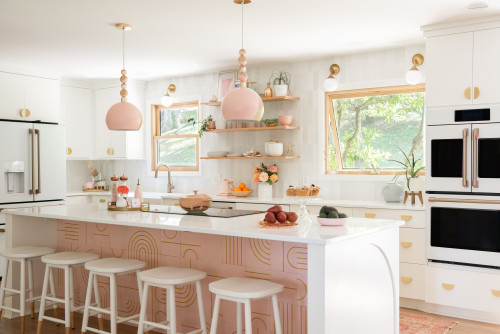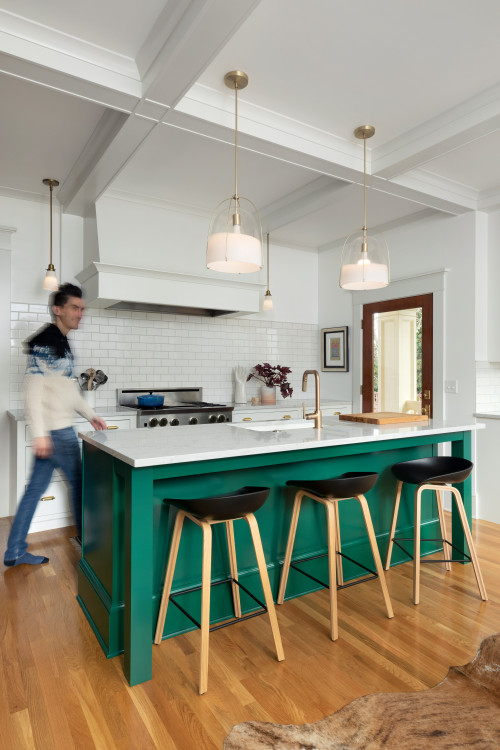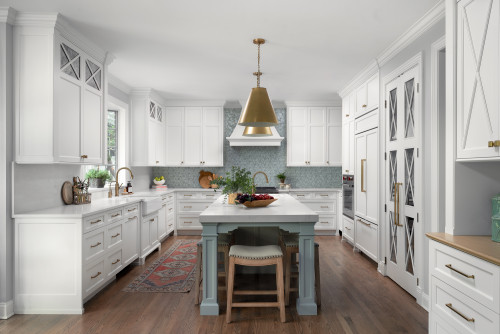Quartz Heat Resistance: A Massive Edge You’ll Want
When choosing countertop materials, heat resistance is an essential factor to consider. Heat-resistant countertops can withstand exposure to hot pots and pans without suffering damage or discoloration. Two popular countertop material options are quartz and granite, both of which are natural stones.
However, the heat resistance of quartz countertops makes them a superior choice for natural stone countertops for kitchens. In this article, we’ll discuss the benefits of choosing heat-resistant quartz countertops for your kitchen and explore why they’re a top choice for homeowners.
So, sit back, relax, and read on to discover the benefits of quartz countertops’ heat resistance!

Are Quartz Countertops Heat Resistant?
Quartz is a popular material for kitchen countertops due to its durability and low maintenance. But are quartz countertops heat-resistant?
The answer is yes! Quartz countertops are made of very heat resistant materials and can withstand exposure to hot pans and excessive heat without suffering damage or discoloration.
What makes quartz heat resistant
Quartz is a heat-proof material made of natural stone that is engineered to be able to withstand high temperatures. A quartz slab is made of roughly 90 percent natural stone combined with resin, making it a solid and durable countertop material.

Temperature tolerance of quartz
Regarding temperature tolerance, quartz countertops can typically withstand temperatures up to 300 degrees Fahrenheit. However, using a hot pad or trivet is always recommended when placing hot pans or dishes on them.
While natural stone countertops like granite are also heat resistant, they can suffer heat damage over time if not correctly sealed, making quartz a more reliable and long-lasting option.
How quartz compares to other materials in terms of heat resistance
| Material | Heat Resistance | Can withstand moderate heat | Direct heat exposure |
|---|---|---|---|
| Quartz | High | Yes | Yes, but can still crack |
| Laminate | Low | No | No |
| Wood | Low | No | No |
| Concrete | Low | No | No |
| Soapstone | Moderate | Yes | No |
| Natural Stone | Low | No | No |
| Granite | Moderate | Yes | Yes, but can still crack |
In terms of heat resistance, quartz countertops are the most reliable choice. Quartz has a high tolerance for heat and can withstand moderate heat without any damage. In contrast, other materials like laminate, wood, concrete, and natural stone cannot withstand moderate or direct heat exposure. The only other countertop materials with heat resistance are soapstone and granite. Ultimately, if you are looking for a heat-resistant countertop material, quartz is your best option.
To sum up:
- Quartz: A highly durable material with excellent heat resistance properties and is the most reliable choice when it comes to heat resistance.
- Laminate: A low-cost material that is prone to heat damage and cannot withstand moderate or direct heat exposure.
- Wood: A warm and traditional option, but not heat-resistant and can easily scorch or warp if exposed to heat.
- Concrete: A trendy and versatile option, but concrete counters are not heat-resistant and can easily discolor or crack if exposed to direct heat.
- Soapstone: A natural option that has moderate heat resistance and can withstand moderate heat without damage.
- Marble: A beautiful and elegant choice, but not heat-resistant and can easily crack or discolor if exposed to heat.
- Granite: Although naturally heat-resistant to an extent, it can still crack if exposed to high temperatures and can be expensive to install.
Quartz vs Granite Heat Resistance
Granite and quartz are both popular materials for countertops, but how do they compare when it comes to heat resistance?
Granite is naturally heat-resistant to a certain extent. It can withstand moderate heat without any damage, but direct heat exposure can cause the granite to crack or become discolored. As a natural stone, granite has a unique appearance, and its heat-resistant properties make it a popular choice for kitchen countertops.
Quartz, on the other hand, is a highly durable material with excellent heat resistance properties. It is substantially more resistant to heat than granite, making it a more reliable choice for high-heat areas like kitchens. While quartz is not completely heat-resistant, it has a higher heat tolerance and can withstand moderate heat without damage. However, like granite, quartz can crack or discolor if exposed to direct heat.
Overall, when it comes to heat resistance, quartz is the more reliable choice. While both granite and quartz have some heat-resistant properties, quartz has a higher heat tolerance, making it a better option for high-heat areas. However, it’s important to note that both materials should be protected from direct heat exposure to prevent damage.
Compared to other kitchen countertop materials, quartz is one of the most heat-resistant materials available for kitchen countertops. So if you’re in the market for a new kitchen countertop and want something that can handle the heat, a quartz countertop is a great choice.

Heat Resistant Quartz: The Ideal Material for High-Temperature Applications
Quartz is an ideal option if you’re looking for a heat-resistant material for your kitchen countertops. Quartz counters are engineered stone surfaces made of natural quartz combined with resin. This composite material makes quartz countertops one of the most durable and heat-resistant.
Advantages of Quartz Countertops for Heat Resistance
One of the main advantages of quartz is its ability to withstand excessive heat exposure. Unlike solid surface countertops, which temperatures above 250 degrees Fahrenheit can damage, quartz counters can handle heat from 300-400 degrees Fahrenheit.
Additionally, quartz is non-porous, which means it doesn’t absorb liquids or stains and is easy to clean with simple soap and water. This makes it an ideal material for high-temperature applications such as cooking, baking, and even outdoor kitchens.

Comparison of Heat Resistance Between Solid Surface and Quartz Countertops
While solid surface countertop materials like Corian can also withstand heat, they are not as durable as quartz counters. Solid surface countertops can crack or melt if exposed to extreme heat, such as a hot pan or hot pot placed directly on them.
Quartz counters are more heat-resistant and will not easily crack or damage.
Granite Countertops as an Alternative
Granite is another popular natural stone material for kitchen countertops. While granite is also heat-resistant, its porous surface makes it more susceptible to staining and bacteria growth.
Granite countertops require regular sealing to keep them free from damage, while quartz counters do not require any special maintenance.
How to Install High-Quality Quartz Countertops for Heat Resistance
When installing quartz countertops, using a high-quality material and following certain precautions are essential. Always use hot pads or trivets under hot objects – like a boiling pot – and don’t place hot pots directly on the surface.
Installing a heat shield behind cooktops and ovens can also help protect your quartz counters from heat.

Quartz countertops are the ideal material for high-temperature applications in the kitchen, offering durability, heat resistance, and ease of maintenance.
Remember to weigh the advantages and disadvantages when considering different countertop materials, and install high-quality quartz countertops to protect your investment.
Quartz Countertops: A Durable and Heat Resistant Option for Your Kitchen
Quartz countertops are popular for kitchens due to their durability, low maintenance, and heat resistance. Quartz is an engineered stone material made of natural quartz mixed with polymer resins, resulting in a highly durable surface resistant to high heat, acidic substances, and stains.
Durability and maintenance of a quartz countertop
One of the main advantages of quartz countertops is their ability to withstand high temperatures without damage or discoloration, making them a safe choice for hot pots and pans, coffee mugs, and other hot items.
However, it’s important to note that repeated exposure to high heat can cause burn marks on the surface of quartz countertops, so it’s still best to use trivets or hot pads to prevent heat damage.

In terms of maintenance, quartz countertops are easy to clean with simple soap and water and do not require any special care or sealing, unlike natural stone materials such as granite and marble, which require regular maintenance to prevent staining or discoloration.
Quartz countertops are also available in various styles and colors, making them a versatile option for any kitchen decor. They are typically sold by the square foot and can be manufactured with multiple finishes and edge styles to fit your personal style and needs.
While quartz is a durable and resistant material, it is crucial to note that it can still be damaged with high pressure or repeated exposure to high heat or acidic substances. But, overall, quartz countertops provide a low-maintenance, durable, and heat-resistant option for your kitchen.

The best area of the home for quartz countertops
Quartz countertops are highly resistant to heat and can withstand temperatures up to 400°F without cracking or melting. They are also highly durable and require minimal maintenance, making them the ideal choice for kitchens that need a low-maintenance, high-performance countertop option.

Keep Your Kitchen Safe with a Heat Resistant Quartz Kitchen Countertop
Here are some tips to protect your countertops and prevent heat damage:

Tips for Using Quartz Surfaces with Hot Cookware
- Always use a trivet or hot pad when placing hot pots, pans, or dishes on your quartz countertops.
- Avoid placing hot cookware directly on the surface of your quartz counter, as repeated exposure to heat can cause burn marks and discoloration.
- Remember that quartz is heat resistant, not heat proof, so caution is essential when handling hot cookware.
How to Prevent Heat Damage to a Quartz Counter
- Never place hot pans or pots directly on the surface of your quartz countertops.
- Avoid placing hot items near the edges of your quartz counter, as high temperatures can cause the resin to soften and warp.
- Use a heat shield or barrier (like a wooden cutting board) when working with high-heat sources like grills, air fryers, or hot plates.

How to Fix Heat Damage on a Quartz Slab
- If your quartz counter has suffered heat damage, it may be possible to repair the surface using a resin filler.
- Consult a professional for repairs, especially if the damage is severe or widespread.
- Avoid DIY repairs, which can worsen the damage and cause further discoloration or stains.
Final thoughts
Quartz countertops are a popular and durable option for kitchens, offering many benefits for heat resistance. Their ability to withstand high temperatures makes them a safe and reliable choice for homeowners who use their kitchens frequently. In addition to being heat resistant, quartz countertops are low maintenance and available in various styles and colors to fit any kitchen decor.
Be sure to take the necessary precautions when handling hot cookware, and always use a trivet or hot pad to protect your quartz countertops from heat damage. With proper care, your quartz countertop can remain beautiful and functional for as long as you want to keep it.
2 comments
Comments are closed.